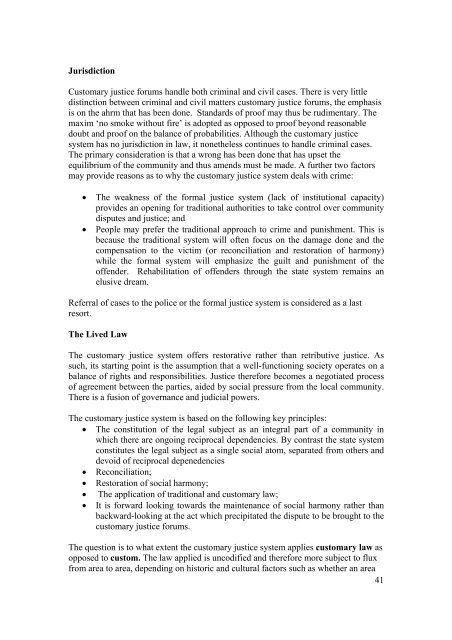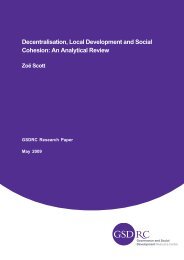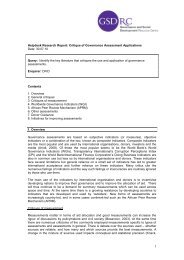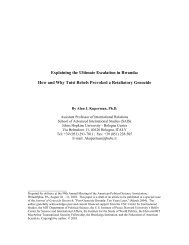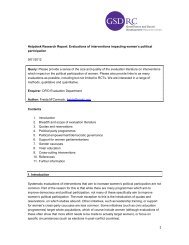ACCESS TO JUSTICE FOR THE POOR OF MALAWI? AN ... - GSDRC
ACCESS TO JUSTICE FOR THE POOR OF MALAWI? AN ... - GSDRC
ACCESS TO JUSTICE FOR THE POOR OF MALAWI? AN ... - GSDRC
- No tags were found...
Create successful ePaper yourself
Turn your PDF publications into a flip-book with our unique Google optimized e-Paper software.
JurisdictionCustomary justice forums handle both criminal and civil cases. There is very littledistinction between criminal and civil matters customary justice forums, the emphasisis on the ahrm that has been done. Standards of proof may thus be rudimentary. Themaxim ‘no smoke without fire’ is adopted as opposed to proof beyond reasonabledoubt and proof on the balance of probabilities. Although the customary justicesystem has no jurisdiction in law, it nonetheless continues to handle criminal cases.The primary consideration is that a wrong has been done that has upset theequilibrium of the community and thus amends must be made. A further two factorsmay provide reasons as to why the customary justice system deals with crime:• The weakness of the formal justice system (lack of institutional capacity)provides an opening for traditional authorities to take control over communitydisputes and justice; and• People may prefer the traditional approach to crime and punishment. This isbecause the traditional system will often focus on the damage done and thecompensation to the victim (or reconciliation and restoration of harmony)while the formal system will emphasize the guilt and punishment of theoffender. Rehabilitation of offenders through the state system remains anelusive dream.Referral of cases to the police or the formal justice system is considered as a lastresort.The Lived LawThe customary justice system offers restorative rather than retributive justice. Assuch, its starting point is the assumption that a well-functioning society operates on abalance of rights and responsibilities. Justice therefore becomes a negotiated processof agreement between the parties, aided by social pressure from the local community.There is a fusion of governance and judicial powers.The customary justice system is based on the following key principles:• The constitution of the legal subject as an integral part of a community inwhich there are ongoing reciprocal dependencies. By contrast the state systemconstitutes the legal subject as a single social atom, separated from others anddevoid of reciprocal depenedencies• Reconciliation;• Restoration of social harmony;• The application of traditional and customary law;• It is forward looking towards the maintenance of social harmony rather thanbackward-looking at the act which precipitated the dispute to be brought to thecustomary justice forums.The question is to what extent the customary justice system applies customary law asopposed to custom. The law applied is uncodified and therefore more subject to fluxfrom area to area, depending on historic and cultural factors such as whether an area41


